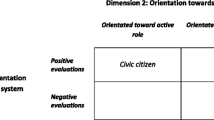Abstract
The set of attitudes, beliefs, and feelings people hold about politics in a society constitutes the political culture of that society (cf. Almond and Powell, 1978: 25). The political culture of a society changes over time. This change is a part and a product of the overall processes of social, economic and political change; yet political culture also influences the nature of those changes, how they occur and how they affect society (Ibid.: 25). The study of political culture enables us to study the processes of overall change in a society and how such changes affect the support accorded to a regime, the way the citizens relate to political processes, and the way policies are formulated and carried out (cf. Almond and Verba, 1980).
Access this chapter
Tax calculation will be finalised at checkout
Purchases are for personal use only
Preview
Unable to display preview. Download preview PDF.
Similar content being viewed by others
Notes
The survey constituted part of a three-nation study focusing mainly on the legislature-legislator and constituent linkages in Kenya, Korea and Turkey. The study was conducted under the auspices of the Comparative Legislative Research Center of the University of Iowa. The survey instrument was prepared at a two week conference held in Iowa City in June, 1973. The study in Turkey was directed by the author during the summer of 1974.
The survey mentioned is the same as the one explained in no. 1, above.
This discussion has borrowed heavily and in some cases verbatim form my “Political Perspectives,” Current Turkish Thought 44–45 (Fall–Winter, 1980), especially pp. 41–44.
Ersin Kalaycioğlu, in his paper “Elite Political Culture and Regime Stability,” has also suggested that Turkish political parties behave as if their ultimate goal is to win the next election. He argues quite convincingly that all other considerations are treated as secondary in importance by political parties.
Editor information
Editors and Affiliations
Rights and permissions
Copyright information
© 1984 Leske Verlag + Budrich GmbH, Opladen
About this chapter
Cite this chapter
Turan, I. (1984). The Evolution of Political Culture in Turkey. In: Evin, A. (eds) Modern Turkey: Continuity and Change. Schriften des Deutschen Orient-Instituts. VS Verlag für Sozialwissenschaften, Wiesbaden. https://doi.org/10.1007/978-3-663-01177-4_5
Download citation
DOI: https://doi.org/10.1007/978-3-663-01177-4_5
Publisher Name: VS Verlag für Sozialwissenschaften, Wiesbaden
Print ISBN: 978-3-8100-0488-8
Online ISBN: 978-3-663-01177-4
eBook Packages: Springer Book Archive




